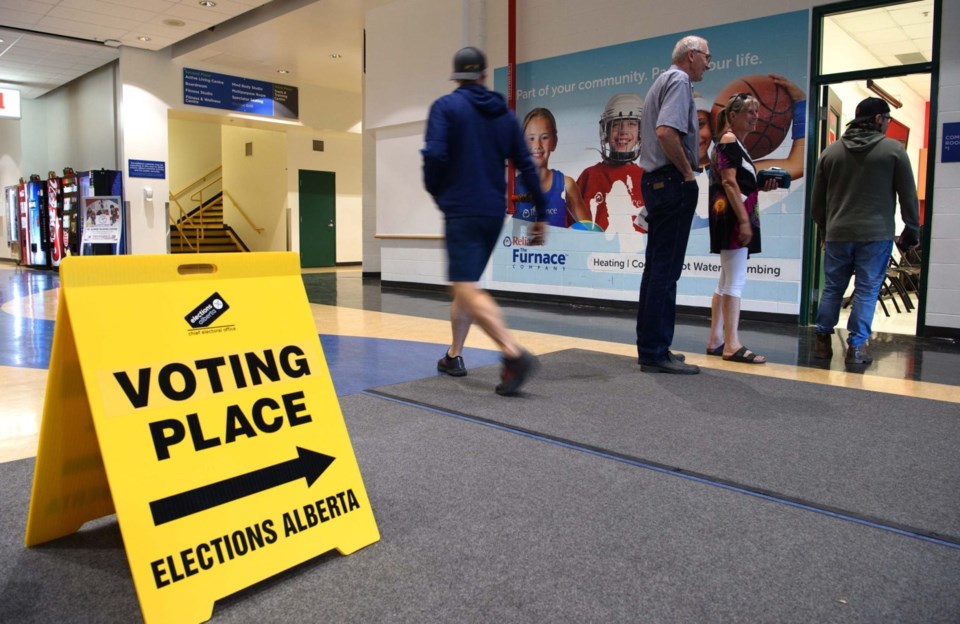Scott Hayes | [email protected]
Local Journalism Initiative Reporter
Albertans still have several days left to participate in surveys that might help shape how civic politics are conducted in the province.
The Ministry of Municipal Affairs’ surveys on the Local Authorities Elections Act and Municipal Government Act are open until next Wednesday.
Alberta Municipalities encouraged everyone to complete the surveys. Many of its member municipalities have expressed their concerns about possible changes to local elections.
These include the introduction of political parties to local elections and barriers that might make more Albertans ineligible to vote in local elections because they lack home addresses or government-issued identification.
Alberta Municipalities president Tyler Gandam said his organization opposes both of those measures.
“I think for us why we're opposing it so much is at the municipal level, one of the great things about being a member of council in a town or a city or a village is that it doesn't matter what political party you belong to. The development of a community has nothing to do with which way you align on the political spectrum,” he said.
“I think you’ll get the possibility that it’ll blur the line of what's important to the residents versus what's important to the political spectrum, whether you lean left or right, in terms of how a municipality grows and creates a good community space for those living and working there.”
Mayor Richard Ireland said council discussed the matter after the recent Alberta Municipalities conference in Edmonton earlier in the fall.
“Consistent with municipal councils and municipally elected officials across the province, we are all opposed to that. To some extent, from my personal perspective, it appears to be a proposed solution looking for a problem,” he said.
“There is no problem with keeping political parties out of municipal elections. It's never been shown, so far as I'm aware, that that would aid anything. Why anybody would think that we should introduce them is beyond me.”
Ireland said bringing in this change would make municipal councillors beholden to an ideology that would supersede their statutory duty to act in the best interests of the community.
With the expertise of Omnibus Research, Alberta Municipalities conducted a survey of its members to gauge their interest in political parties entering the municipal election forum. The result was 68 per cent against while respondents with post-graduate educations were 77 per cent against.
On the issue of voter eligibility, Gandam said that with the election cycle the way that it is, he hoped that anyone who wants to be involved in an election – either by voting or running for office – would ensure that they had the proper documents and resources available for them to be a part of that as well.
Mayor Ireland’s view was about making the democratic process more participatory.
“I think change that makes it easier for the people who receive the service of the municipal government to vote in the outcome of the election is a good thing. I think we should encourage as much voting as we can get out here,” Ireland said, speaking personally on the matter.
Both of those contentious issues are part of the survey on the Local Authorities Elections Act, which also seeks input on the voter list, advance voting, and runoff elections for Chief Elected Officials.
The survey on the Municipal Government Act seeks public input on municipal councillor training requirements, allowing a council to meet in private, authority to remove a councillor, disclosures by a municipal councillor (including conflicts of interest), disqualification rules for municipal councillors and municipal councillor recall thresholds.
The surveys can be found by visiting your.alberta.ca/councilor-accountability-laea/survey_tools/laea and your.alberta.ca/councilor-accountability-laea/survey_tools/mga.
The deadline to offer your feedback via both surveys is Dec. 6.
Gandam added that already the response rate on these surveys has been higher than that for similar surveys that the Government of Alberta conducted in 2020. Those brought in approximately 4,000 responses, a very low rate when you consider that the province’s population was close to 4.4 million at the time.
Already, there have been more than 6,000 responses on these two surveys.




